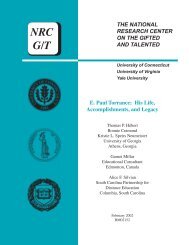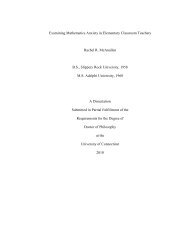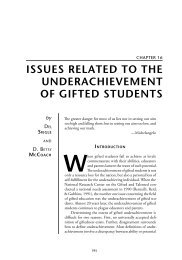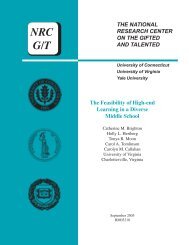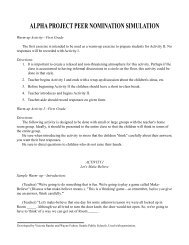Giftedness and High School Dropouts - Neag Center for Gifted ...
Giftedness and High School Dropouts - Neag Center for Gifted ...
Giftedness and High School Dropouts - Neag Center for Gifted ...
Create successful ePaper yourself
Turn your PDF publications into a flip-book with our unique Google optimized e-Paper software.
8<br />
Commitment<br />
s<br />
Academic<br />
System<br />
Commitment<br />
s<br />
Family<br />
Background<br />
Grade<br />
Per<strong>for</strong>mance<br />
Intellectual<br />
Development<br />
Academic<br />
Integration<br />
Goal<br />
Commitment<br />
Individual<br />
Attributes<br />
Goal<br />
Commitment<br />
Institutional<br />
Commitment<br />
Peer-Group<br />
Interactions<br />
Institutional<br />
Commitment<br />
Dropout<br />
Decisions<br />
Pre-college<br />
<strong>School</strong>ing<br />
Faculty<br />
Interactions<br />
Social<br />
Integration<br />
Social System<br />
Figure 1. Tinto's conceptual schema <strong>for</strong> dropping out of college.<br />
Source: This figure was quoted from the article, Tinto, V. (1975). Dropout from higher education: A<br />
theoretical synthesis of recent research. Review of Educational Research, 45(1), p. 95.<br />
Personal <strong>and</strong> Family Background<br />
The literature has suggested that factors from the students' personal backgrounds<br />
such as sex, race, socioeconomic status, family background, <strong>and</strong> personal problems affect<br />
the students' decision to drop out of high school. Some research studies (Beacham, 1980;<br />
National <strong>Center</strong> <strong>for</strong> Education Statistics, 1993; Nelson, 1985; Young & Reich, 1974)<br />
reported that dropouts were most frequently males, while other research studies reported<br />
opposite results (Curtis, McDonald, Doss, & Davis, 1983; Noth & O' Neill, 1981).<br />
French (1969) studied the reasons <strong>for</strong> dropping out by sex <strong>and</strong> marital status. Examining<br />
125 male dropouts, 55 married female dropouts, <strong>and</strong> 26 unmarried female dropouts, he<br />
found the reasons that married females dropped out were quite different from those of<br />
male <strong>and</strong> unmarried female dropouts. Many male dropouts left school because they did<br />
not like school (20%), they were asked to leave (18%), or they wanted to get a job (17%).<br />
Unmarried female dropouts left school because they did not like it (20%); others left<br />
school because they wanted jobs (16%), they had failing grades (12%), or they were<br />
needed at home (12%). However, a majority (82%) of the married female dropouts left<br />
school because of marriage.






